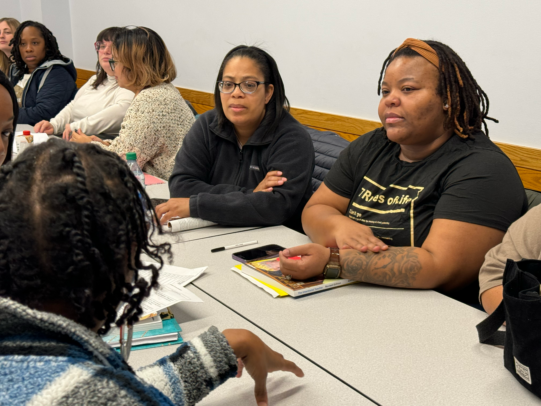Chicago teachers find success with Alternative Early Childhood Licensure Program

“I’m not a renter anymore,” Charkeya Jackson said. “I was able to buy a house because as my pay increased, every time I earned another credit, I was able to think outside the box and elevate myself, my life, my kids.”
Jackson was the lead teacher for 3- to 5-year-old children at New Horizons Altgeld for nine years before enrolling in the UIC College of Education’s Alternative Licensure program. Because she didn’t have a teaching license, her salary was on the low end for teachers. But through the program at UIC, Jackson was able to do her teaching residency where she already works, removing one of the main barriers to getting her teaching license. The classes are held in the evenings, which also support teachers who are in the field.
After completing the program, Jackson saw her salary more than double.
In partnership with the City of Chicago Early Learning Workforce Scholarship, the UIC College of Education established the innovative Alternative Licensure Program in 2019. The program prioritizes, recruits and supports child care workers from underserved communities to earn an Illinois Professional Educator License. These workers care for children from babies to age 5, and the care and education the children receive have a long-lasting impact.
Sandra Jimenez chose the program because she wanted a program that was different. “Something out of my comfort zone,” she said. Initially, Jimenez thought she would simply get her license and be done. She wasn’t expecting the program to change her life.
“It was so much more than I expected,” Jimenez said. “I got so much more than I ever thought,” allowing her to grow both as a person and a teacher.
Jimenez said the program helps her to best represent students like her who have struggled, been in special education classes and lived in poverty. “I am able to be a teacher my students can see themselves in,” she said.
While she worried she wouldn’t be able to pass the licensure test, Jimenez passed it on the first try. She credited the quality of the program and support of instructors for that.
Jimenez is excited to be able to work in a Chicago Public School. “I’m able to give back to the community where I grew up,” she said.
“We designed this program to build on the expertise and experience of the early-childhood workforce and reduce barriers they often face when returning to school to earn advanced degrees and credentials,” said Cathy Main, director of early childhood education at UIC.
More than 200 students have enrolled in the Alternative Early Licensure Program since 2019. Ninety-eight percent of them are women of color, with over half identifying as Black and having an average of 15 years of experience in early childhood education.
Both Jackson and Jimenez said the program gave them skills that made them better teachers, access to a network of quality teachers and the ability to advance in their workplace.
